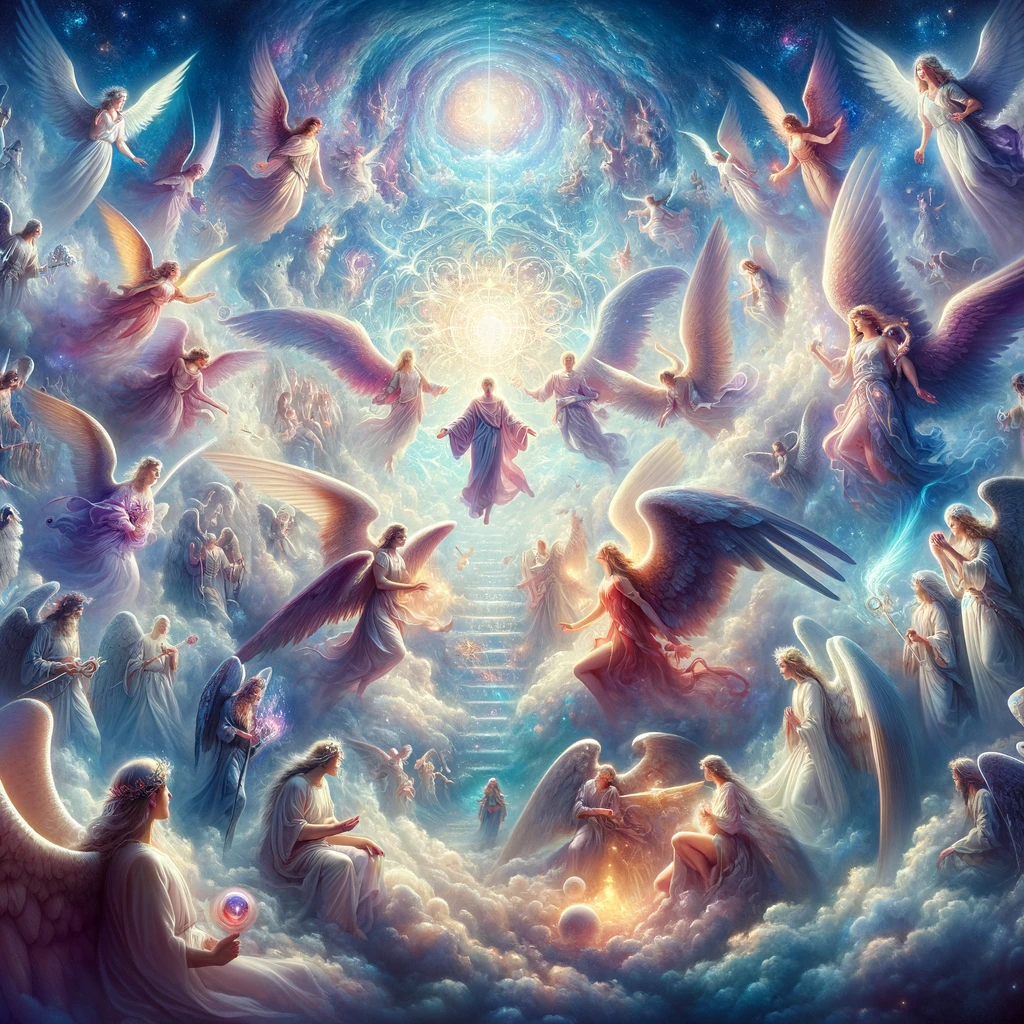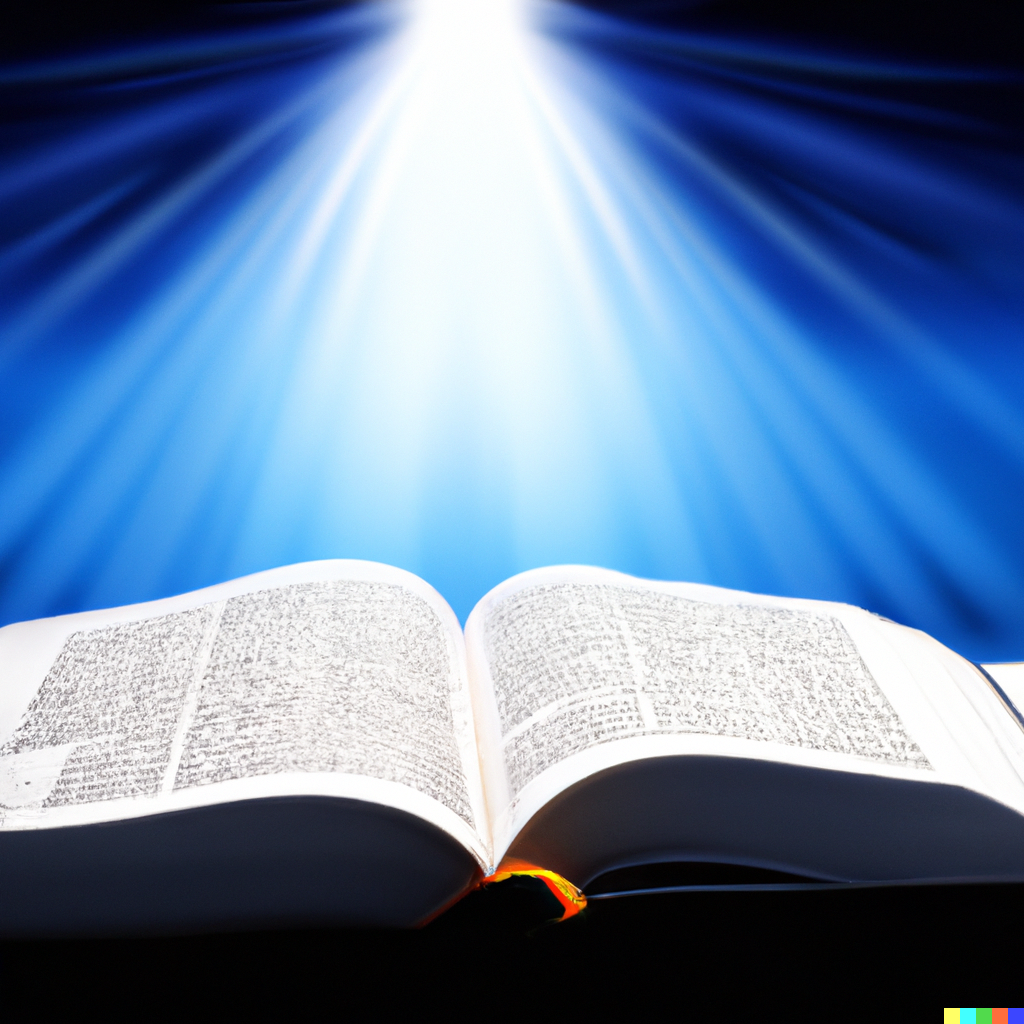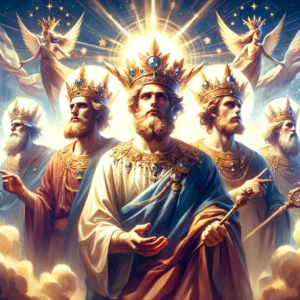
Angelology
Step into the enchanting world of Eastern Orthodox theology, where angelology takes center stage.... View more
Principalities
-
Principalities
Principalities: Divine Stewards of Nations Oversee groups, nations, and world leaders, guiding them in accordance with divine will, often shown with crowns or scepters to signify their governance.
“A class of spiritual being (Gk. archḗ), most often evil (cf. Rom. 8:38; 1 Cor. 15:24; Eph. 1:21; 3:10; 6:12; Col. 1:16; 2:10, 15). The term always occurs with other similar terms also denoting evil spiritual beings: power (exousɩ́a), authority (dýnamis), throne (thrónos), dominion (kyriótēs), world-rulers of this age (kosmokrátōr toú skótous toútou), evil spiritual force in the heavens (pneumatikón tḗs ponērɩ́as en toɩ́s epouranɩ́ois). The use of different terms probably indicates different ranks or types of evil spiritual beings. In Eph. 2:2; 6:11–12 Paul identifies one evil spiritual being to which these others seem to be subject: “the ruler of the power of the air” or “the devil.” In Dan. 7 “dominion” (LXX Gk. archḗ) denotes the earthly power of the fourth beast (vv. 12, 26) hostile to Israel and standing in contrast to the power of God and the one like a son of man (v. 14); that lurking in the background of earthly kingdoms—esp. the fourth kingdom—are evil spiritual beings, is clear from Dan. 10.” (1)“The perversities of human conduct, in particular, thwarting, as was thought, the simple, intelligible Divine plan, were held to be subject to rebellious powers offering defiance to God. While Paul clearly recognized a hierarchy of such powers (Col 1:16, “thrones or dominions or principalities or powers”), it is not certain that he had elaborated a system of aeons to serve the purposes of metaphysical theology and ethics, such as appears among the Gnostics, although they evidently believed they were developing his thought. In 1 Cor 2:6 he repudiates the wisdom of this world (aiō̇n) and of the rulers of this world aiō̇n), and declares (Eph 6:12) that the Christian has to contend with “the world-rulers of this darkness,” and proclaims the triumph of Christ over “the principalities and the powers” in the forgiveness of sins (Col 2:15).” (2)
“A new understanding of principalities and powers has been supported with increasing confidence by scholars since World War II. Historian E. G. Rupp applied the expression to economic, social, and political structures. His justification is that the same helplessness felt by “little people” when events move too quickly for them may be described mythically in terms of demonic powers (as in the NT) or sociologically in terms of dehumanizing structures (as today). G. B. Caird applied the term to the state, legal religion, and nature. Hendrikus Berkhof maintained that while borrowing the expression from Jewish apocalyptic, Paul demythologized it: he viewed principalities and powers not as heavenly spirits but as earthly structures. Influenced by Berkhof, John Howard Yoder identified the powers with abstract religious, intellectual, moral, and political structures that have absolutized themselves and demand unconditional loyalty. On the cross, Jesus, who was not the slave of any power, law, custom, community, institution, value, or theory, destroyed the powers’ pretensions to sovereignty, thus making authentic living possible. This newer understanding has been taken up further by Walter Wink and others. Yet it has been questioned by John Stott and Peter O’Brien. They insist, first, that principalities and powers must be supernatural beings since they are confronted by Christ “in the heavenly places” (Eph. 1:20; 3:10; 6:12). Second, the Christian’s warfare is specifically said to be “not with flesh and blood” (Eph. 6:12). Third, Jesus believed in angels and exorcism, although it was not inevitable that he should; the Sadducees did not (Acts 23:8). Despite Yoder’s claim that the newer scholarly understanding is the product of cultural empathy greater than any since the apostolic age, this tendency to identify the principalities and powers with human or abstract, impersonal forces probably is the result of cultural presuppositions determining exegesis. It is more likely that traditional cultures (e.g., the Melanesian) where spirit worship is common are better placed to understand Paul’s meaning. It is possible, however, that Paul intended his reference to thrones, dominions, principalities, and authorities in Colossians 1:16 to embrace earthly as well as heavenly powers (J. B. Lightfoot). The matter invites further research.” (3)Sources:(1) Smith, Barry D. “Principality.” Ed. David Noel Freedman, Allen C. Myers, and Astrid B. Beck. Eerdmans dictionary of the Bible 2000: 1084. Print.
(2) Heidel, William Arthur. “Principality.” Ed. James Orr et al. The International Standard Bible Encyclopaedia 1915: 2454–2455. Print.(3) Piggin, F. Stuart. “Principalities and Powers.” Ed. Daniel J. Treier and Walter A. Elwell. Evangelical Dictionary of Theology 2017: 698–699. Print.
Log in to reply.


